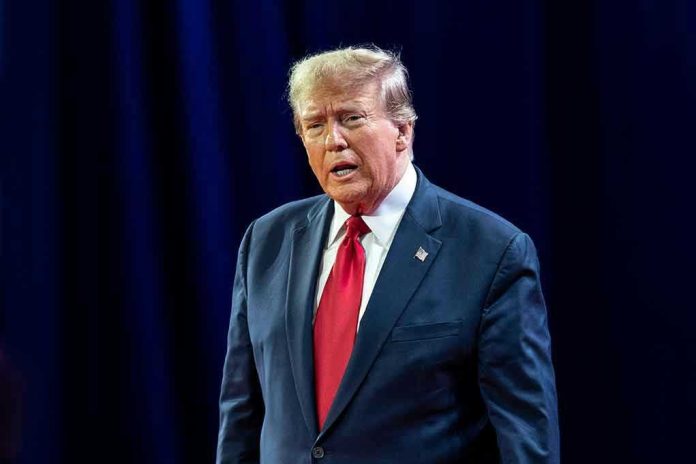
One unscripted question about habeas corpus exposed a rift in presidential authority, legal history, and the very foundation of American civil liberties—leaving the nation to wonder: if the president can’t define our rights, who will defend them?
Quick Take
- President Trump’s confusion over habeas corpus during a live White House event triggered a national debate on executive power and constitutional rights.
- The rare legal tool of suspending habeas corpus has deep roots in American history and grave consequences for civil liberties.
- Trump’s administration, especially Stephen Miller, has been openly considering extraordinary legal measures to confront unrest and immigration, facing strong judicial resistance.
- This episode spotlights the tension between public safety, presidential authority, and the checks that preserve individual freedom.
Presidential Confusion on a Constitutional Pillar
The White House’s “Antifa roundtable” on October 8, 2025, will be remembered less for its policy proposals than for one stunning moment of presidential uncertainty. When a friendly reporter lobbed what should have been a softball—asking if President Trump planned to suspend habeas corpus to deal with “insurrectionists”—the president blinked, paused, and replied, “Suspending who?” Homeland Security Secretary Kristi Noem received the question instead, but the damage was done. That moment instantly became a flashpoint, exposing not just a personal gap in legal knowledge but the potential fragility of constitutional protections in the highest office.
Habeas corpus is no obscure legal trivia. It is the cornerstone that prevents the government from holding anyone—citizen or not—indefinitely without a judge’s review. The Constitution allows its suspension only in extreme emergencies: “rebellion or invasion.” In over two centuries, only four presidents have wielded this power, always under national duress. That a president could stumble over its meaning, while his administration flirts with invoking it, set off alarms among legal scholars and civil libertarians alike.
The Road to a Constitutional Showdown
The seeds of this confrontation were sown throughout 2025. Unrest in American cities, often blamed on Antifa and immigrants, led the Trump administration—particularly policy architect Stephen Miller—to openly consider dusting off rarely used constitutional levers. Miller’s public musings about suspending habeas corpus echoed through conservative media and rattled legal watchdogs. Trump’s invocation of the Alien Enemies Act to expedite deportations of migrants had already been slapped down by federal judges, including one of his own appointees. Each legal defeat only seemed to intensify the administration’s search for bolder solutions, even as the courts repeatedly signaled the limits of executive power.
i am almost certain that trump doesn't know what "habeas corpus" is – when asked direct question about suspending it for deportations, he said "who?"
— hasanabi (@hasanthehun) October 8, 2025
Despite the tough talk, no formal move to suspend habeas corpus emerged. Judicial decisions consistently rejected the administration’s argument that street unrest or border crossings amounted to an “invasion” justifying suspension. Still, the language of existential threat—“rebellion,” “invasion”—became a drumbeat, heightening public anxiety and political polarization. The October roundtable, meant to project strength, instead became a showcase of constitutional vulnerability.
Rare Precedent, High Stakes, and Unforgiving History
Suspending habeas corpus is not a tool for routine governance. Abraham Lincoln did it during the Civil War; during Reconstruction in South Carolina, after the Philippine insurrection, and in Hawaii after Pearl Harbor, presidents followed suit—but always under extraordinary circumstances, and always controversially. Legal historians and the National Constitution Center agree: the bar for suspension is—and must remain—extremely high. The courts have drawn sharp red lines to prevent its use as a shortcut for political expediency or crowd control. Trump’s “who?” moment was not just a personal gaffe, but a reminder of how fragile such boundaries can become under pressure.
Legal scholars warn that even floating the idea of suspending habeas corpus for domestic unrest or immigration undermines faith in due process and signals a willingness to bypass constitutional guardrails. Critics argue that executive ignorance or opportunism in such matters erodes trust in government, while supporters insist that extraordinary threats demand extraordinary tools. But the courts and the Constitution have, so far, sided with caution and precedent over panic.
National Trust, Public Scrutiny, and the Future of Liberty
The aftermath of Trump’s “Antifa roundtable” confusion was swift and unforgiving. Media outlets, legal experts, and politicians dissected the exchange, questioning not just the president’s grasp of constitutional law, but the broader readiness of the executive branch to wield—or restrain—its power. Public scrutiny intensified, with critics warning of a slippery slope toward unchecked detention and erosion of civil rights. For communities already feeling targeted—protesters, immigrants—the prospect of indefinite detention without recourse became chillingly plausible.
‘Who?’ Trump stumbles after being asked about the suspension of Habeas Corpus during Antifa roundtable https://t.co/hP0QGwLlxp #DementiaDictator #dementiadonnie
— 🇨🇦JustATweeter🇨🇦 (@JustATweeterToo) October 9, 2025
While the courts blocked the administration’s most aggressive moves, the debate over habeas corpus did not fade. Instead, it sharpened: How far can a president go in the name of public safety? Who decides when an emergency justifies suspending foundational rights? For Americans over forty, who have seen the pendulum of executive authority swing post-9/11 and during border crises, the open question is not just about definitions but about vigilance. As history shows, rights lost in emergencies are rarely regained easily. The real lesson of the “suspending who?” moment may be the need for constant, informed scrutiny—because if the president fumbles the Constitution, every citizen pays the price.










